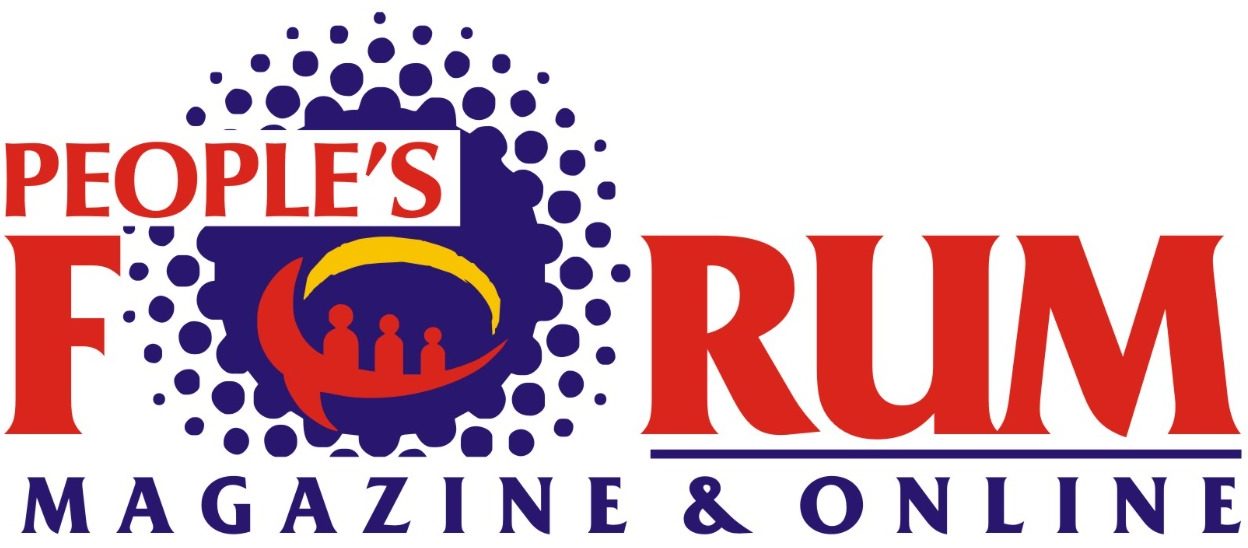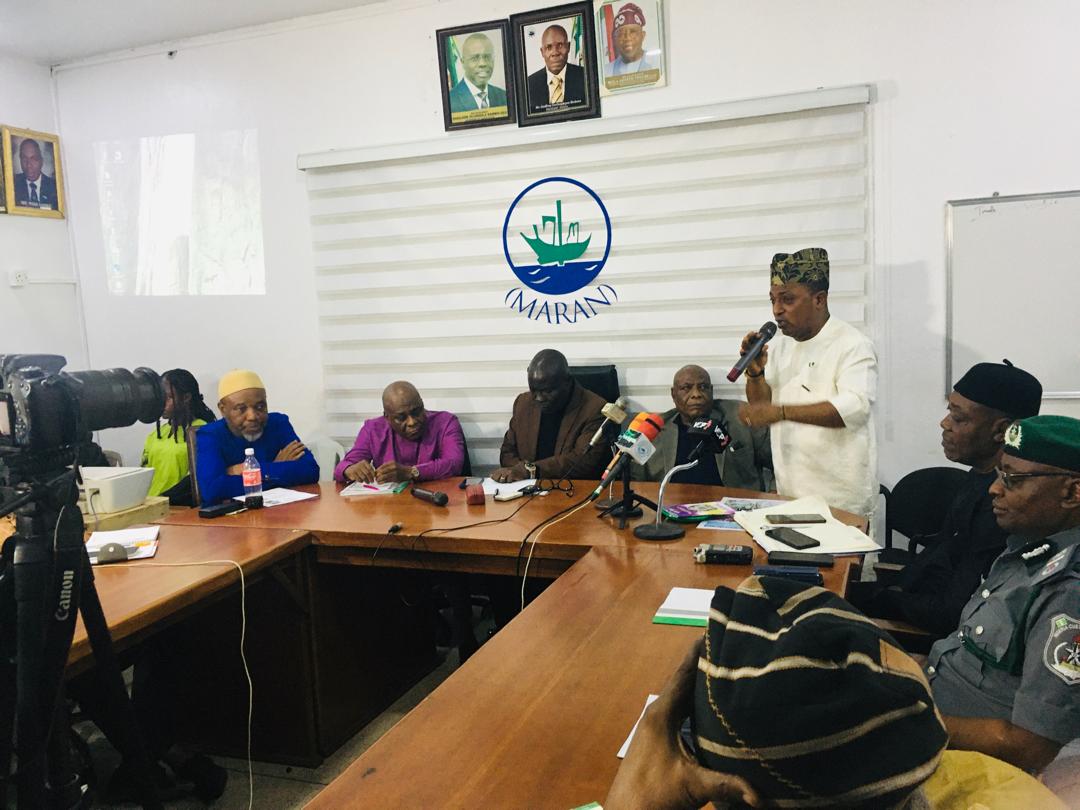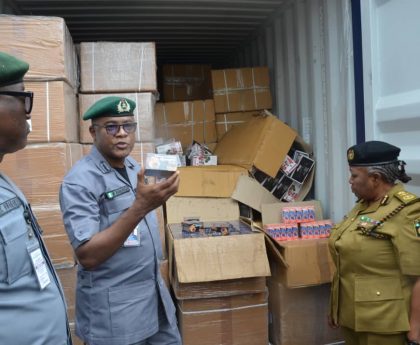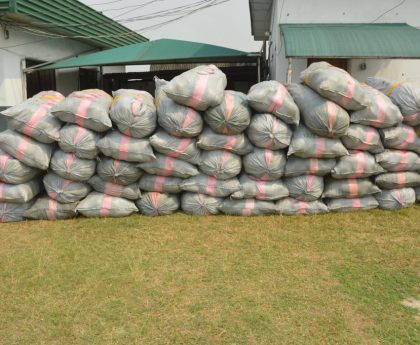The Nigeria Customs Service (NCS) has addressed the valid concerns raised by various stakeholders on the fears of increased clearance costs when the International Cargo Transit Note (ICTN) is introduced.
Speaking at a Roundtable Discussion organized by the Maritime Reporters Association of Nigeria (MARAN) on ICTN with the theme “Proposed Cargo Tracking Note:A Second Look by Critical Stakeholders”, the Zone A Coordinator, Nigeria Customs Service, ACG OC Orbih, assured maritime players that
the costs would be offset by savings from
reduced delays, demurrage charges, and more efficient operations as suggested by international evidence of countries where the scheme is in operation.
The Zonal Coordinator disclosed that the Service is
actively working with stakeholders to establish a fee structure that balances
system sustainability with business competitiveness.
On bureaucracy and procedural complications, Orbih noted that
implementation strategy directly
addresses this through system integration and process automation.
He emphasized that rather
than creating additional procedures, ICTN will
streamline existing ones by providing a single platform for information
submission and verification.
On legal backing, the Customs Chief informed that
Section 28 of the Nigeria Customs Service Act, 2023 explicitly empowers
the Service to develop and maintain electronic systems for cargo tracking.
“This legal framework ensures proper authority for implementation while
protecting stakeholder interests.
The Nigeria Customs Service envisions a measured, phased implementation
approach. Throughout this process, we will maintain open dialogue with
stakeholders, incorporating feedback and making necessary adjustments to
ensure the system serves its intended purpose without creating undue
burden,” the Zonal Coordinator assured.
He noted to that it’s not merely about adopting new technology but about
fundamentally improving how maritime trade in Nigeria is conducted.
Orbih maintained that the successful implementation will position Nigerian ports as more efficient,
transparent, and competitive gateways for international trade.
He enjoined stakeholders to work together with the implementors in a way that the International Cargo Tracking Note will serve national interests while facilitating international trade.
According to him, the future of Nigerian maritime sector depends on the ability to embrace and
effectively implement modern solutions that enhance both security and
efficiency.
Orbih described the implementation of the International Cargo Tracking Note (ICTN) as
representing a significant opportunity to transform Nigeria’s maritime
operations and enhance her competitiveness in global trade.
In his words: “This initiative,
re-introduced by the Federal Government through the Ministry of Marine
and Blue Economy, offers concrete solutions to long-standing challenges in
our ports.
“The benefits of International Cargo Tracking Note implementation are
substantial and far-reaching. The system significantly enhances security
and risk management by providing information in advance about cargo,
enabling better threat assessment and targeted inspections. This enhanced
security framework has proven effective in reducing cargo loss and theft in
countries that have implemented the system.
“Additionally, the International Cargo Tracking Note will facilitate trade and
improve ease of doing business in our ports. The system enables pre-arrival
processing of cargo information, significantly reducing documentation
processing time.
“Furthermore, International Cargo Tracking Note’s integration with existing
systems will create a seamless information flow between customs, and
other stakeholders. This integration enables real-time cargo tracking, faster
manifest verification, and automated risk assessment. These improvements
directly translate to reduced dwell time, lower demurrage charges, and
more predictable cargo delivery schedules for businesses.”
The Zonal Coordinator averred that evidence from other African nations supports these benefits, citing Nigeria’s next
door neighbour, Ghana, as a prime example.
He hinted that the Ghana Revenue
Authority’s implementation of International Cargo Tracking Note since
2015 has demonstrated remarkable improvements in cargo clearance
efficiency and revenue collection.
“Similarly, Kenya’s adoption of
International Cargo Tracking Note in 2014 has led to substantial reductions
in cargo dwell time and enhanced operational efficiency.
Beyond the shores of our continent, Turkey and Brazil’s implementation of
International Cargo Tracking Note offers particularly compelling evidence
of the system’s transformative potential in a large, complex maritime
environment. Their sophisticated approach has drastically reduced the need for physical cargo inspections while maintaining robust security
standards.
He expressed his gratitude to MARAN for organizing this crucial
roundtable discussion, commending the association for its dedication to fostering informed dialogue
within the Nigerian maritime sector.
Representative of Dr. Pius Akutah, the Executive Secretary/Chief Executive Officer, Nigerian Shippers’ Council (NSC), Mr. Celestine Akujobi, Director, Consumer Affairs, pointed out that ICTN started many years ago.
Akujobi declared that it was a United Nations Conference on Trade and Development (UNCTAD) advisory that the Nigerian Shippers Council should monitor movement of cargo.
He said that ICTN is a cargo facilitation and that the Central Bank of Nigeria (CBN) and Nigeria Customs Service are part of it. He added that NSC is looking at an angle of making the cost minimal as it’s not a revenue generating concept.
Akujobi argued that ICTN concept is a security issue and that whether NSC or Customs is in charge is immaterial, saying that what’s important is its implementation as done in other climes.
Noting that Benin Republic started it in 2006, he said it was earlier implemented in Nigeria successfully but was suspended and that NSC is ready to go ahead with it and see how it will be of benefit to all.
However, the National President, National Council of Managing Directors of Licensed Customs Agents (NCMDLCA), Mr. Lucky Eyis Amiwero, disagreed that ICTN is an UNCTAD advisory, saying that it’s not a convention or a rule and it is not tied to service in its implementation in Nigeria.
Amiwero highlighted that NSC was established to protect shippers’ interest and has no law to back implementation of ICTN. “You cannot operate a system without a law,” he stated.
He said that ICTN started with the Nigerian Ports Authority (NPA) and that the first, second and third implementation of it was not tied to any service. He stood his ground that implementation of ICTN in Benin Republic was tied to service, informing that ICTN implementation is already in Customs operation and that it will amount to duplication to give it to any other agency.
Amiwero lamented that the ministry, NPA, NSCICTN: Customs Allays Fears of Increased Clearance Costs; Says Savings From Reduced Delays Will Offset Costs
The Nigeria Customs Service (NCS) has addressed the valid concerns raised by various stakeholders on the fears of increased clearance costs when the International Cargo Transit Note (ICTN) is implemented.
Speaking at a Roundtable Discussion organized by the Maritime Reporters Association of Nigeria (MARAN) on ICTN with the theme “Proposed Cargo Tracking Note:A Second Look by Critical Stakeholders”, the Zone A Coordinator, Nigeria Customs Service, ACG OC Orbih, assured maritime players that
the costs would be offset by savings from
reduced delays, demurrage charges, and more efficient operations as suggested by international evidence of countries where the scheme is in operation.
The Zonal Coordinator disclosed that the Service is
actively working with stakeholders to establish a fee structure that balances
system sustainability with business competitiveness.
On bureaucracy and procedural complications, Orbih noted that
implementation strategy directly
addresses this through system integration and process automation.
He emphasized that rather
than creating additional procedures, ICTN will
streamline existing ones by providing a single platform for information
submission and verification.
On legal backing, the Customs Chief informed that
Section 28 of the Nigeria Customs Service Act, 2023 explicitly empowers
the Service to develop and maintain electronic systems for cargo tracking.
“This legal framework ensures proper authority for implementation while
protecting stakeholder interests.
The Nigeria Customs Service envisions a measured, phased implementation
approach. Throughout this process, we will maintain open dialogue with
stakeholders, incorporating feedback and making necessary adjustments to
ensure the system serves its intended purpose without creating undue
burden,” the Zonal Coordinator assured.
He noted to that it’s not merely about adopting new technology but about
fundamentally improving how maritime trade in Nigeria is conducted.
Orbih maintained that the successful implementation will position Nigerian ports as more efficient,
transparent, and competitive gateways for international trade.
He enjoined stakeholders to work together with the implementing body in a way that the International Cargo Tracking Note will serve national interests while facilitating international trade.
According to him, the future of Nigerian maritime sector depends on the ability to embrace and
effectively implement modern solutions that enhance both security and
efficiency.
Orbih described the implementation of the International Cargo Tracking Note (ICTN) as
representing a significant opportunity to transform Nigeria’s maritime
operations and enhance her competitiveness in global trade.
In his words: “This initiative,
re-introduced by the Federal Government through the Ministry of Marine
and Blue Economy, offers concrete solutions to long-standing challenges in
our ports.
“The benefits of International Cargo Tracking Note implementation are
substantial and far-reaching. The system significantly enhances security
and risk management by providing information in advance about cargo,
enabling better threat assessment and targeted inspections. This enhanced
security framework has proven effective in reducing cargo loss and theft in
countries that have implemented the system.
“Additionally, the International Cargo Tracking Note will facilitate trade and
improve ease of doing business in our ports. The system enables pre-arrival
processing of cargo information, significantly reducing documentation
processing time.
“Furthermore, International Cargo Tracking Note’s integration with existing
systems will create a seamless information flow between customs, and
other stakeholders. This integration enables real-time cargo tracking, faster
manifest verification, and automated risk assessment. These improvements
directly translate to reduced dwell time, lower demurrage charges, and
more predictable cargo delivery schedules for businesses.”
The Zonal Coordinator averred that evidenced from other African nations supports these benefits, citing Nigeria’s next
door neighbour, Ghana, as a prime example.
He hinted that the Ghana Revenue
Authority’s implementation of International Cargo Tracking Note since
2015 has demonstrated remarkable improvements in cargo clearance
efficiency and revenue collection.
“Similarly, Kenya’s adoption of
International Cargo Tracking Note in 2014 has led to substantial reductions
in cargo dwell time and enhanced operational efficiency.
Beyond the shores of our continent, Turkey and Brazil’s implementation of
International Cargo Tracking Note offers particularly compelling evidence
of the system’s transformative potential in a large, complex maritime
environment. Their sophisticated approach has drastically reduced the need for physical cargo inspections while maintaining robust security
standards.
He expressed his gratitude to MARAN for organizing this crucial
roundtable discussion, commending the association for its dedication to fostering informed dialogue
within the Nigerian maritime sector.
Representative of Dr. Pius Akutah, the Executive Secretary/Chief Executive Officer, Nigerian Shippers’ Council (NSC), Mr. Celestine Akujobi, Director, Consumer Affairs, pointed out that ICTN started many years ago.
Akujobi declared that it was a United Nations Conference on Trade and Development (UNCTAD) advisory that the Nigerian Shippers Council should monitor movement of cargo.
He said that ICTN is a cargo facilitation and that the Central Bank of Nigeria (CBN) and Nigeria Customs Service are part of it. He added that NSC is looking at an angle of making the cost minimal as it’s not a revenue generating concept.
Akujobi argued that ICTN concept is a security issue and that whether NSC or Customs is in charge is immaterial, saying that what’s important is its implementation as done in other climes.
Noting that Benin Republic started it in 2006, he said it was earlier implemented in Nigeria successfully but was suspended and that NSC is ready to go ahead with it and see how it will be of benefit to all.
However, the National President, National Council of Managing Directors of Licensed Customs Agents (NCMDLCA), Mr. Lucky Eyis Amiwero, disagreed that ICTN is an UNCTAD advisory, saying that it’s not a convention or a rule and it is not tied to service in its implementation in Nigeria.
Amiwero highlighted that NSC was established to protect shippers’ interest and has no law to back implementation of ICTN. “You cannot operate a system without a law,” he stated.
He said that ICTN started with the Nigerian Ports Authority (NPA) and that the first, second and third implementation of it was not tied to any service. He stood his ground that implementation of ICTN in Benin Republic was tied to service, informing that ICTN implementation is already in Customs operation and that it will amount to duplication to give it to any other agency.
Amiwero lamented that the ministry, NPA, NSC are introducing charges where there is no law backing them, insisting that ICTN is not backed by any law.
His words: “ICTN is not backed by law. It’s just to make money for a few people. It’s already subsumed in Customs law. It’s going to obstruct clearance of goods. It’s not backed by law and not tied to any service.”
The NCMDLCA President in addition said that ICTN is implemented in most countries by Customs save for a few nations.
In his own presentation, Dr. Eugene Nweke of Sea Empowerment and Research Center (SEREC), said that research revealed that 32 countries in Africa are implementing ICTN, adding that there’s the need for it implementation in Nigeria for checks and balances.
Nweke argued that ICTN will bring compliance and ensure safety and security of the nation.
In his contribution, the Chairman of Widescope International Logistics, Dr. Segun Musa, described ICTN as an intellectual fraud that would not fly.
He said emphatically that ICTN was resisted in the aviation industry when he wrote IOTA which later wrote NCAA before it was cancelled forthwith.
Musa insisted that there’s no need for anything like ICTN again since Customs requests for advance manifest which reveal concealment even as 100% examination will reveal anything that is concealed.
He maintained that ICTN is a fraud and that critical players will not allow some businessmen to use the government agencies and few compromised stakeholders to rip Nigerians off.
The transport analyst stated as people that import, clear, pay and buy goods he and others will resist the reintroduction of ICTN and take it up to the Presidency. He warned those convincing and confusing the Federal Government on ICTN as it will not fly.
Earlier in his welcome speech, the President of MARAN, Godfrey Bivbere, stated that the introduction and reintroduction of the International Cargo Tracking Note (ICTN), is a matter of utmost importance to Nigeria’s maritime sector and, indeed, the national economy, declaring that the desire of the association is that at the end of the discussion Nigeria will benefit.
Bivbere noted that the ICTN is not just a concept or an idea but a transformative automated system that has the potential to revolutionize the way Nigeria monitors cargo entering the country.
“Through the ICTN, we can determine the type and volume of cargo imported into our seaports within specific time frames. Beyond the ability to collect and track cargo information, this system has the capacity to generate billions of naira in revenue for the Nigerian government, particularly in revenue areas currently being missed at our borders,” he said.
He he’s of the opinion that there’s more to this system as it will also help to monitor the exact quantity of daily crude oil exports, a critical matter for Africa’s largest oil-producing nation. In doing so, it will significantly help in curbing the menace of oil theft that has plagued the nation for years.
According to him, this is why the ICTN is not just a tool but a lifeline for tackling some of the critical challenges facing the nation’s maritime industry and the Nigerian economy at large.
The MARAN President submitted that unfortunately the journey toward implementing this scheme has been fraught with challenges and delays. Going memory lane, he noted that the idea of “tracking cargo was first proposed during the administration of former President Olusegun Obasanjo back in 2004. Yet, despite its obvious benefits, the scheme has been put on hold multiple times. At one point, it only operated for less than two years before being suspended. Why? Because of corruption, bureaucratic bottlenecks, and internal battles for control among key stakeholders. These delays have led to missed opportunities, both in revenue generation and in improving the transparency of our cargo management processes.
“In 2007, a proposal from the Ports Management System Company Limited (TPMS) and its partners was being reviewed for implementation. However, political changes led to further delays. By the time the Federal Executive Council approved the project in 2010, another setback came in 2011 when the scheme was halted by the Presidential Task Force on Port Reforms, citing various concerns. During its short period of operation, the ICTN generated €16.7 million in revenue, of which the federal government was entitled to €10 million. However, only a portion of this was remitted, and the remaining funds were unaccounted for.
This lack of transparency raised even more questions about the integrity of the system, and the scheme was shelved once again.
“The controversies surrounding the ICTN are not without merit. Importers and clearing agents have raised concerns about duplications of charges. They have pointed out that their cargos are already being tracked by the Nigerian Customs Service from origin to destination, and therefore, adding a second layer of tracking via the ICTN creates unnecessary costs. These complaints are valid and need to be addressed if we are to move forward with this initiative.
“As we move to reintroduce the ICTN, it is critical that we approach it with a fresh perspective and an understanding of the lessons learned from the past. We must ensure that there is no duplication of efforts, that transparency is prioritized, and that the concerns of all stakeholders are heard and addressed. It is with this in mind that the Maritime Reporters Association of Nigeria (MARAN) has decided to take the lead in organizing this roundtable discussion.
“The time has come to resolve the controversies and come to a consensus. MARAN, as the leading maritime beat association in Nigeria, recognizes the importance of fostering dialogue and understanding among all parties involved.
“We have invited key stakeholders, including industry experts, government agencies, and representatives from the importers and clearing agents, to come together to discuss the ICTN’s prospects and challenges.
“This roundtable today is bringing together a diverse group of players in the maritime sector, including Dr. Eugene Nweke of the Sea Empowerment and Research Center, Dr. Segun Musa, Managing Director of Widescope Nigeria Limited, and Dr. Alban Igwe of the Importers Association of Nigeria. Representatives from two critical government agencies, the Nigerian Shippers’ Council (NSC) and the Nigerian Ports Authority (NPA), to discuss their perspectives. We cannot afford to delay any longer. As we come together today to engage in this critical conversation, let us remember that our collective goal is to build a better, more efficient maritime industry that will drive the economic growth of Nigeria.
“It is imperative that we address the key concerns from all sides—the government, the private sector, the importers, and the clearing agents—so that we can move forward with a system that is effective, transparent, and beneficial for all parties involved. We will dissect the issues, challenge assumptions, and work together to find lasting solutions. The future of our maritime industry and, by extension, our economy, depends on it.
“Since the news of the planned reintroduction of the ICTN broke, there have been polarised debates. Some in support the initiative, while others raise valid concerns. As an association, we have chosen to take the middle ground—to facilitate a discussion that will allow us to separate the facts from the opinions, and the solutions from the problems.
“The controversies surrounding the ICTN cannot be ignored any longer. We, as an industry, must settle this issue once and for all. This roundtable is an important step in that direction, and I am confident that, with the commitment and cooperation of all stakeholders, we will chart a course for the successful implementation of the ICTN in a way that benefits the entire country,” the MARAN President stated.





